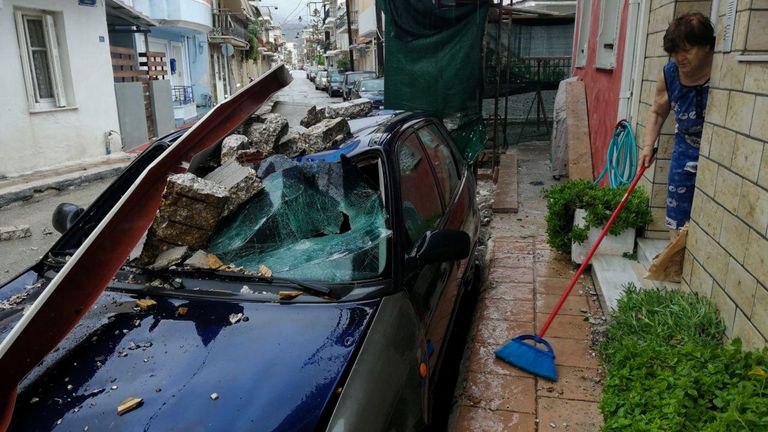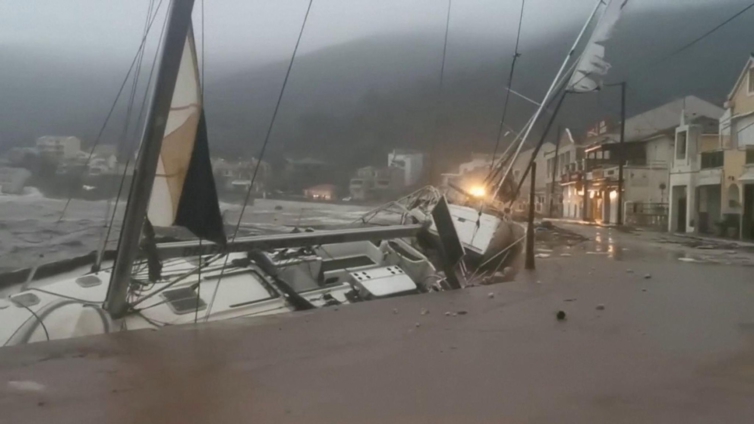
Audio By Carbonatix
At least two people have been killed after a "medicane" - a rare Mediterranean hurricane toppled trees, cut power and flooded streets in Greece.
Storm Ianos hit the Ionian islands and the western Peloponnese on Friday before lashing the centre of the country on Saturday.
Greece's weather agency warned of damage and threat to life as it issued alerts for many areas.
An elderly woman was found dead in a flooded house in Farsala and the body of 63-year-old man was discovered near a hospital in Karditsa.
A #Medicane is hitting #Greece today.
It is a MEDIterranean hurriCANE which brings high winds and waves and torrential rain and flooding.
Hybrid between tropical cyclone and mid-latitude storm.
Activity peaks between Sept and Janhttps://t.co/emjHIRGq1d
Image: @eumetsat pic.twitter.com/95BXFyzz5y— World Meteorological Organization (@WMO) September 18, 2020
"We're dealing with a total catastrophe," one Farsala resident told state television.
Areas of Karditsa, one of Greece's biggest plains - around 125 miles (200km) north of Athens, were swamped with water and a bridge collapsed.
The fire service said it had received more than 2,450 calls since the storm began - to rescue people, cut down trees and pump water from houses and businesses.
Five boats also sank off the holiday islands of Zakynthos (also known as Zante) and Lefkada on Friday, said the coastguard.
Greece's civil protection agency declared a state of emergency on Kefalonia, Ithaca and Zakynthos as power was cut in many areas.
Very strong winds and lots of sea foam being blown in at the coast in #Kefalonia Island, Greece this morning 18th September as #Medicane #Ianos makes landfall! Video by 📸 https://t.co/EVr5SlnO71 pic.twitter.com/28ETSaixBU
— WEATHER/ METEO WORLD (@StormchaserUKEU) September 18, 2020
Kefalonia's mayor, Theofilos Michalatos, said no one was hurt but that homes, roads and water facilities had been damaged.
The storm reached the Athens area on Saturday but there have so far been no reports of damage. Trains between the capital and the second city of Thessaloniki were suspended.

A medicane is a hybrid phenomenon with "some characteristics of a tropical cyclone and others of a mid-latitude storm", according to the UN's World Meteorological Organization.
They have strong winds spinning around a central core and torrential rain, but are smaller in diameter than hurricanes and don't last as long - typically 24 to 48 hours.
Such storms first appeared in Greece in 1995 and, while far less common than hurricanes have become more frequent in recent years.
Latest Stories
-
An open letter to H.E. John Dramani Mahama: The audacity of the third shift
21 minutes -
A new era of healthcare dawns in Kintampo: Mary Queen of Love Medical Hospital opens its doors
1 hour -
NDC gov’t has demonstrated strong fiscal discipline – Abdulai Alhassan
1 hour -
Heavily armed Burkinabè soldiers arrested in Ghana
1 hour -
Tamale Chief commends IGP Special Operations Team for crime reduction efforts
2 hours -
None of NPP’s 5 flagbearer aspirants is credible – Abdulai Alhassan
2 hours -
Police arrest suspect for unlawful possession and attempted sale of firearm
3 hours -
3 arrested in connection with Tema robberies
4 hours -
Your mouth on weed is nothing to smile about
4 hours -
25% university fees hike, what was the plan all along? — Kristy Sakyi queries
5 hours -
Some OMCs reduce fuel prices; petrol going for GH¢10.86, diesel GH¢11.96
6 hours -
Trump says health is ‘perfect’ amid ageing concerns
6 hours -
China’s BYD set to overtake Tesla as world’s top EV seller
6 hours -
Joy FM’s iconic 90’s Jam returns tonight: Bigger, better, and packed with nostalgia
7 hours -
Uproar as UG fees skyrocket by over 25% for 2025/2026 academic year
8 hours

